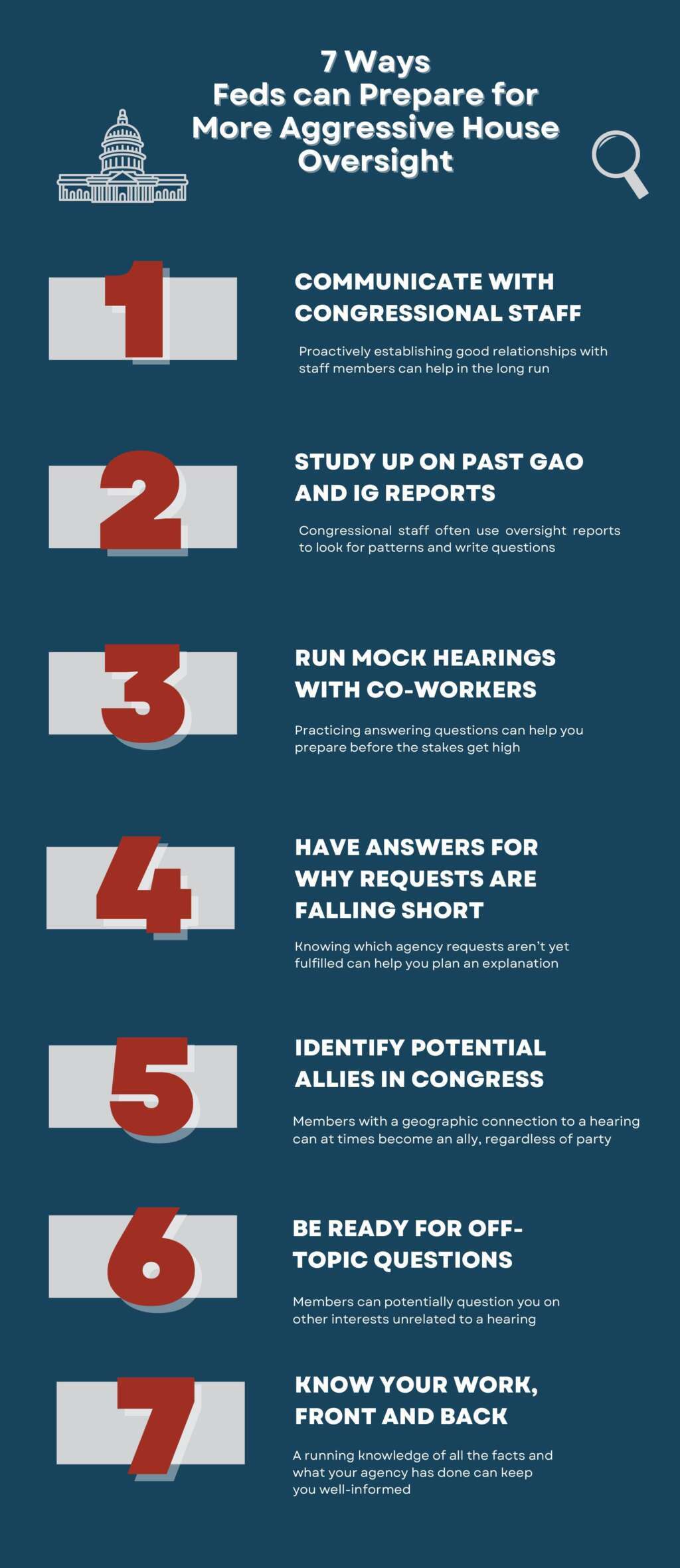
How agency leaders can prepare for more aggressive House oversight
A partisan divide between the White House and Congress could have big repercussions for the career federal workforce. Here’s what agency leaders can do to...
A shift in power in the House brings with it looming threats to agency leaders, by putting them at risk of deeper and likely more adversarial investigations.
Republican leaders on the Oversight and Accountability Committee have already promised to carry out exactly what the new committee name suggests: accountability.
As Rep. James Comer (R-Ky.), the committee’s chairman, organizes his plans to zero in on more robust oversight of the Biden administration, career feds should prepare to position themselves more assertively.
“I’m fed up with the public corruption, I’m fed up with the excessive spending and I want to do something about it,” Comer said at a Jan. 30 press conference. “That’s my goal. That’s what I hope to do with the House Oversight Committee. I think that we can play a huge role in investigating this administration.”
The tone shift for the House Oversight and Accountability Committee, now nearly 100 years old, stretches beyond just a name change. Comer has promised much deeper, more robust investigations into the administration, something he said didn’t happen under Democratic committee leadership.
“We’re two years behind in oversight,” Comer said. “We’re going to have to go back two years to try to get caught up, in addition to providing the current oversight and future oversight.”
The now Republican-led committee’s decision to swap out the word “reform” for “accountability” indicates a larger shift in the committee’s priorities for the 118th Congress. Administration officials will soon see a much more robust investigation agenda, said Andy Wright, former staff director and counsel for the committee’s National Security and Foreign Affairs Subcommittee, from 2007 to 2011.
“If you think about a shift from reform to accountability, that suggests a more adversarial posture. It is going to be less about finding legislative solutions to a particular issue, and more about bringing accountability to people who have potentially done something that Congress thinks is wrong,” said Wright, a current partner at K&L Gates, in an interview with Federal News Network. “It portrays a deeper change in the posture between the executive branch and the new Congress.”
The political tensions of a government now divided by party between the executive branch and Congress can have serious implications for the career federal workforce.

“Federal employees can often be casualties of that tension,” said Chris Keeven, an attorney at Shaw Bransford & Roth. “Given those competing political interests, both sides are at times happy to put some blame on the career workforce.”
Julie Dunne, former staff director and senior counsel for the Oversight committee’s Government Operations Subcommittee, from 2017 to 2019, said this split in power between Democrats and Republicans is certainly not a new phenomenon, and past patterns may suggest how it will impact oversight this Congress.
“When you have split power in Washington, and you’ve got administration with one party and Congress with the other, they’re going to ask some deeper questions,” Dunne, also a former commissioner of the Federal Acquisition Service at the General Services Administration, and a current principal at Monument Advocacy, told Federal News Network. “There’s a general conservative viewpoint that we need to make sure we’re spending federal money in an efficient and effective manner. When there’s a lot of money being spent, you can’t always see what’s going on.”
Some of the committee majority’s priorities thus far have centered on oversight of COVID-19 pandemic spending and attempts to return federal employees to the office, as well as plans to conduct multiple investigations of the Biden administration. Comer has also shared plans to investigate prescription drug pricing, the origins of the COVID-19 pandemic and the withdrawal from Afghanistan, to name a few others.
But the investigations will likely become broader than that as well. Comer has vowed to return the committee to its “primary mission,” to “root out waste, fraud, abuse and mismanagement in the federal government and hold the Biden administration accountable,” according to a January press release.
Ranking Member Jamie Raskin (D-Md.) serves as Comer’s counterweight on the House Oversight Committee this Congress. He has, at times, called out Republican committee members for partisanship, and described the House Rules package, for example, as “efforts to weaponize Congress against the U.S. government, the federal workforce and the American people.”
Overall, Congressional investigations and hearings, which federal officials often come into as witnesses, are unique in how they play out, largely due to their partisan nature.
“It’s political theatre. There’s a lot of spin, exaggeration and hyperbole. Your average career civil servants, they’re not used to being in the political arena. When all of a sudden you get put into that new world of politics, it’s a very different game and a very different process. I think that really catches people off guard,” Keeven said.
So, what does this really mean for career federal employees — those in leadership roles who weren’t politically appointed to their positions, and who transcend presidential administrations? Federal News Network spoke to sources to find out how agency officials can get ready for more aggressive oversight.
Prepare, prepare, prepare
“Prepare, prepare, prepare” — that’s Dunne’s biggest advice to federal officials for making a strong case during a committee hearing.
“Be sure you have a working knowledge of the facts in play and understand, as a principal, what’s been going on at the staff level— both congressional staff and your staff,” she said. “Make sure you understand the tenor of those communications, you understand what requests are outstanding and you have a good answer as to why those requests are outstanding. I think people that had more trouble, they just didn’t have the right preparation.”
Co-workers and agency staff can practice, in part, by pretending to be committee members — commonly referred to as a “murder board” — asking questions and setting up mock conversations with leaders who are asked to testify. Dunne said this type of preparation can help officials get ready for the hearing process.
“When you’re sitting there at the table and having to answer questions, the stakes are high. There’s a federal statute that says you can’t lie to Congress, so you want to get it right,” Dunne said.
Mike Hettinger, a former House Oversight and Reform Committee staff member from 2003 to 2007, and current president of Hettinger Strategy Group, said executive branch leaders need to be “prepared for anything.”
“You get a lot of members that will come in and have something they want to talk about, which may or may not be what the hearing was focused on,” Hettinger said. “Be prepared for those questions to come rapid fire and aggressively. The questions are designed probably in a lot of ways to push people back on their heels a little bit, which is different than softer oversight that you may have gotten from a Democratic Congress.”
Expect more aggressive oversight
Keeven added that “the number one thing is being self-aware enough of the political reality. Many people fall into the trap of thinking, ‘I did nothing wrong, I’ve got nothing to hide, I’m going to go in and tell my side of the story and share what information I have, and everything’s going to be fine.’ But given the political dynamics, unfortunately, that’s not often the case.”
Even within just the first few weeks of the new Congress, there has already been a more forceful oversight posture, Hettinger said, adding that generally, Republicans conduct oversight differently, and in most cases, that means they conduct it more aggressively.
“If you’re sitting there in the administration, in a place where maybe you haven’t had a ton of robust oversight coming from a Democratic Congress, you should expect a lot more,” he said. “I think we’ve seen that historically, and we’ve seen that initially. Agency personnel need to be ready for that.”
Regardless of the party in power in a chamber, Dunne said the basics of preparing for a hearing don’t necessarily change. The one difference, she added, is that leaders will likely get more pointed questions from committee members.
Because the congressional chambers are split by partisan control, some of the legislative agenda from House Republicans this Congress won’t necessarily be enacted, but there are other methods for getting across their priorities.
“The option as a Republican in the House is to use oversight,” Hettinger said. “Then using that oversight base, you can potentially bring others along. If they can’t get done what they want to get done legislatively, they’re going to use the oversight process to, at the very least, raise the issue and poke holes in it.”
Work with staff and study up
It can sometimes take months of preparation for a committee hearing. During that time, congressional staff members will typically gather information from inspectors general and Government Accountability Office reports to look for patterns or trends at an agency.
Information from IG and GAO reports will then help staff members write questions for the witnesses. The questions themselves often depend on the context of the hearing.
“They’re trying to frame it in a way that is going to have more of a public relations impact. Maybe the questions are framed a little bit differently, because they’re designed for the cameras,” Wright, a partner at K&L Gates, said.
While it’s important for officials to review past reports to prepare for questions, agencies usually do well when they send witnesses who intrinsically know the information, too.
“If you send someone up who’s constantly looking at their notes, or refers back to their written statement, or turns around to the staff sitting behind them, that’s not great. If you have a witness that is intimately involved in whatever issue it is, understands it and can effectively answer the questions, I think those are the best witnesses, particularly when you have a situation that might get testy over time,” Hettinger said.
Generally, congressional staff members will meet with witnesses and agency officials ahead of hearings. Being proactive in that relationship can give federal officials a bit of an edge too. Creating good communications with staff, especially early on in the process, is key.
“It’s important, regardless of party, to establish communications at the staff level pretty early on, even if there might be some bad news to deliver,” Dunne said. “It’s good to have frank conversations.”
Notably, the majority party also gets to double their staff members, according to Wright. That helps them devote more resources toward issues they particularly want to focus on.
“A lot of this is going to be about what the chairs decide they want to spend their time on and devote their staff resources to — where they think they’re going to get the most bang for the buck,” Wright said.
Addressing the problems earlier— before arriving at the hearing stage — can help agency officials present their best case to Congress. It can also be beneficial to try to pinpoint allies.
“Congress has 535 members, and there may be some who are more in favor, not just on a partisan basis, but maybe on a geographic basis. Maybe your agency has an important facility in their district, and they might not have the same incentives to attack a certain policy choice,” Wright said.
Though it may become more aggressive, congressional oversight is in theory designed to create a better federal government.
“[The system] can be messy, but I think in the long run, it serves us well that we do have oversight,” Dunne said. “People that have been around in the federal agency space understand that sometimes it’s not so much fun. But I think we all eventually learn something. And hopefully, it informs how to get better at government going forward.”
Copyright © 2025 Federal News Network. All rights reserved. This website is not intended for users located within the European Economic Area.
Drew Friedman is a workforce, pay and benefits reporter for Federal News Network.
Follow @dfriedmanWFED
Related Stories

Federal watchdogs still uncovering full scope of fraud in $5T COVID-19 spending




